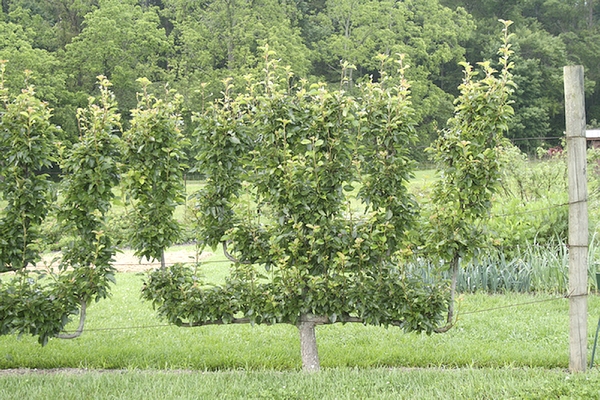Amy-Lynn Albertson: Fruit trees in the home garden
Published 12:00 am Friday, January 15, 2016

- Submitted photo Espaliered apple trees on the grounds of Biltmore Estates. Trees trained like this take up less room in a garden.
You don’t have to have a large amount of property to grow fruit trees. Lots of fruit and nut trees can be grown in Rowan County. Some of the most popular include, apples, peaches, persimmons, pears and pecans. You can grow your own orchard even if you have the smallest of gardens — be sure to try growing several different kinds.
Variety selection is a very important step to consider before planting a fruit tree. Many people want to grow the same varieties they buy in the grocery store, but some of those are grown in climates very different from North Carolina’s.
It’s also important to look at disease resistance in fruit trees. Many of the grocery store varieties of pear, like Bartlett and Bosc, are very susceptible to a disease called fire blight. Look for varieties that are labeled disease resistant or tolerant.
If you are really limited on space, but want fruit trees anyway, you may grow dwarf trees. Dwarf trees will bear fruit of normal size, but on trees that grow just 8 to 12 feet tall. Though they won’t bear heavy crops like standard and semi-dwarf trees, they will provide a good harvest of fresh fruit.
You can train your own espaliers, if you are patient. Espaliers will require some dedication, taking from three to four years to train. The method of espalier means to grow a plant flat against a wall, fence or trellis. In this manner you can grow a variety of fruit trees in a limited space.
They are excellent space savers, perfect for small gardens. They offer easier access for gardeners with limited mobility. Because they are less susceptible to breaking branches, these trees have an incredible life span. You can find espaliered apple trees that are 150 years old and still producing fruit.
You need a tree that is self-fruitful or doesn’t need another tree for a pollinator, if you only have room for one fruit tree. Pecans, persimmons, most apples and pears require at least two trees for pollination. Peach trees and figs are self-fruitful.
Pruning is something that many homeowners stress about. With proper training, annual pruning is simple and quick. The key to getting great fruit production is proper training and pruning. Don’t lose hope if you have inherited a fruit tree that hasn’t been pruned in ages. It is possible to rejuvenate an older, neglected fruit tree, but you will not have good fruit production for a couple of years afterward.
If you are a citrus lover, you can grow those too, but it takes a little more dedication to your plant. I know many gardeners with dwarf citrus trees in pots that they roll in and out of the house throughout the winter on warm days and outside all summer. While it takes more effort, the glory of being able to tell people you grew that lemon or orange in your own backyard is worth the effort.
For more information on fruit trees or other horticultural topics please contact the Rowan County Extension Office at 704-216-8970, or on the web at rowan.ces.ncsu.edu.




